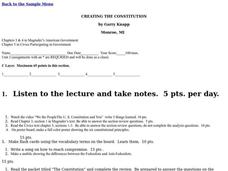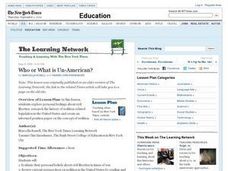Curated OER
Municipal Government in South Carolina
Twelfth graders complete several activities as they study and explore the three different types of municipal governments allowed in South Carolina and the types of services provided for people within these metropolitan areas.
Curated OER
CREATING THE CONSTITUTION
Students engage in a variety of activities aimed at strengthening comprehension of the Constitution. The activities are part of a layered curriculum and students create a portfolio for assessment.
Curated OER
What Is the Bill of Rights?
Students discuss the purpose of the Bill of Rights and the United States Constitution. In groups, they write about the ten amendments and their purpose. They re-word the Amendments in their own way and answer discussion questions to end...
Curated OER
Who or What is Un-American?
Students explore concepts about civil liberties, research the history of sedition-related legislation in the U.S. and create a position paper on the topic.
Curated OER
Launching Your Ship with Citizenship Lesson 4: Hoisting the Flag
Students discuss the U.S. electoral process and brainstorm solutions to increase voter turnout in their community. In this democratic citizenship lesson, students identify keywords in speech and video related to freedom of speech and...
Judicial Learning Center
The Power of Judicial Review
Marbury v. Madison is arguably the most important landmark case in the history of the Supreme Court. A fact-filled lesson provides background information about the case and two others related to the concept of judicial review. Scholars...
Ohio Center For Law-Related Education
Four Activities: Thurgood Marshall and the Nomination and Confirmation of Federal Judges
The process of nominating and confirming federal judges can sound like a lot of bureaucratic hoops, but a resource breaks down the steps of the Supreme Court nominations in a simpler manner. Learners participate in four activities that...
Curated OER
American History Through the Len of the Supreme Court Decisions
Students examine the historical background of Supreme Court decisions and the basic principles behind legislation. As part of the lesson, students discover legal concepts and terms and write sentences using the vocabulary they have...
K12 Reader
Responsibilities of Citizenship
Your pupils are all citizens of your classroom. Provide some more instruction on how people can be citizens with the reading passage included here. After reading, learners answer the five related questions.
Judicial Learning Center
Types of Court Cases
How can one court acquit someone of a crime, while another convicts the person of the same one? It's all because of the differences between civil and criminal trials. An informative resource provides scholars in the field of criminology...
Judicial Learning Center
Your 1st Amendment Rights
Why should classes care about the First Amendment? An engaging lesson serves as a powerful tool for answering just that. As all four cases in the lesson relate directly to freedom of expression in schools, young scholars explore the...
Judicial Learning Center
State Courts vs. Federal Courts
Popular culture often portrays the Feds as the most fearsome of law enforcement agencies. Yet, someone charged with a crime is considerably more likely to end up in a state court. The lesson, one of six covering the Organization of the...
Theodore Roosevelt Association
Interpreting the Past; Assessing Its Impact on the Present
Even though the presidency of Theodore Roosevelt ended over 100 years ago, we can still learn something from his stances and policies that is applicable today. Class members first look over a list of prevalent political issues from the...
Curated OER
The Bill of Rights in Current Events
Divided the class into pairs, each group is assigned one of the amendments. They use the internet to research current cases and issues involving their amendment. They are then lead into the introduction to some of the basic concepts of...
Judicial Learning Center
The Judge and the Jury
Unless you are a lawyer, you might not understand just how unrealistic Law and Order and other legal dramas actually are. Here's a great resource to help scholars of criminology gain a more realistic perspective. The lesson outlines the...
Curated OER
US & Iroquois Constitution Parallels
Eighth graders identify and compare the stated purposes of the Iroquois and US Constitutions, and their roles as living documents.
Curated OER
The Bill of Rights
Ninth graders examine various Supreme Court Cases. In this American Government lesson, 9th graders research a specific Supreme Court Case. Students create a multiple choice assignment based on their assigned case.
Curated OER
War of 1812 Begins
In this United States history worksheet, students utilize a word bank of 10 terms or phrases to answer 10 fill in the blank questions about the beginning of the War of 1812. A short answer question is included as well.
Curated OER
History of the Bill of Rights
Students study the history of the Bill of Rights. In this Bill of Rights lesson, students read and use two handouts to learn about the history of the Bill of Rights. Students then work in groups to study the Bill of Rights. Students then...
Curated OER
Bill of Rights
Students define the Bill of Rights, identify and explain each amendment, and explain why these amendments were included in the Constitution.
Curated OER
Civil War and Reconstruction
Fourth graders investigate the Civil War by researching the state of Virginia. In this US History lesson, 4th graders identify Abraham Lincoln, James Chestnut and Fort Sumter, and discuss their roles in the start of the Civil War. ...
Foreign Policy Research Institute
Understanding China: The Prospects for Democracy in China
This document provides useful information for a unit on democracy in China. While it does not include detailed activities, it does have a list of democratic principles, and important facts about China that facilitate understanding of its...
Curated OER
Search and Seizure: What Does It Mean?
Students, in a juvenile correctional facility, study the meaning of the Fourth Constitutional Amendment. They study definitions and complete worksheets to investigate the implications of the amendment.
Digital History
The Whiskey Rebellion
Can you imagine an army of 5,000 rebels prepared to march against the United States government over...whiskey? This is exactly what happened in 1794, and your young historians will be fascinated to read about the events that led up to...

























